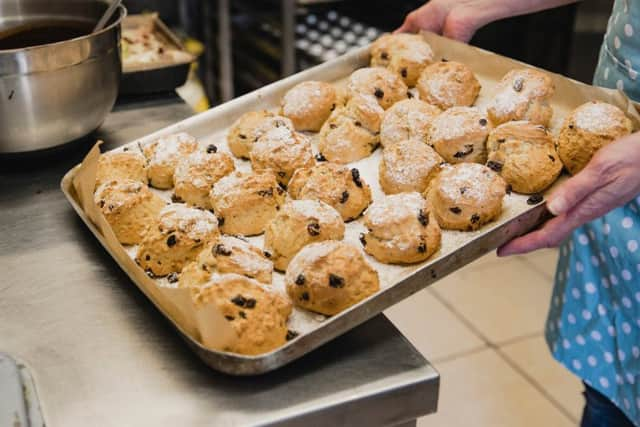Hidden health risks in NI’s teatime favourite
and live on Freeview channel 276
Fans of the traditional teatime treat may be shocked to learn that a large scone can equate to a third of recommended daily calories, according to a new survey.
A sample of scones produced in the Province has revealed that some can contain a whopping 750 calories – equivalent to 10 sugar cubes.
Advertisement
Hide AdAdvertisement
Hide AdIn 2018, Northern Ireland’s 11 district councils – in partnership with the Food Standards Agency (FSA) – sampled a variety of plain, luxury and fruit scones from local coffee shops and cafes across the country.


The scone with the highest fat content (22.7g fat) was a raspberry and white chocolate luxury scone, while the largest, a fruit scone, contained in the region of 750kcal and 39.2g of sugar.
Some 64% of adults and 27% of children aged 2-15 in NI are currently classified as overweight or obese.
Fionnuala Close, senior dietary health advisor at FSA in Northern Ireland, said: “As scones tend to be a regular favourite for many across Northern Ireland, we felt it was important to raise awareness that this common snack can contain a greater number of calories than consumers may think.
Advertisement
Hide AdAdvertisement
Hide Ad“The availability of choice, in terms of ingredients and scone size, is an important consideration for consumers and producers alike.
“FSA is committed to working with academia and industry on technical guidance that will help businesses to reformulate recipes and produce baked goods that contain reduced sugar, salt and fat and promote smaller portion sizes.
“We would encourage consumers to be aware of their recommended daily calorie intake and consider food and drink choices which help them achieve a balanced, healthy diet.
“To eat well, foods which are high in fat, salt and sugar should be eaten less often and in small amounts.”
Other key findings in the report include:
Advertisement
Hide AdAdvertisement
Hide Ad• the range of calories varied widely from 154kcal to 756kcal;
• the portion sizes of scones ranged from 44g to 233g;
• generally, as portion size increased, the number of calories also increased;
• the average scone provided 20g of sugar which is the equivalent of five sugar cubes;
• the range of sugar per scone varied between 3.1g to 39.2g, with fruit scones generally providing higher sugar levels;
• the range of fat per scone varied between 3.4g to 22.7g;
• the average scone provided 1.9g of salt.